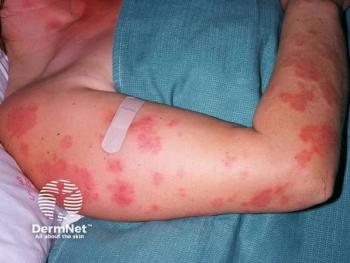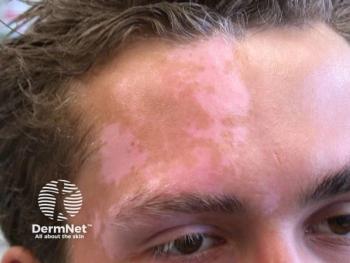
FDA Approves Pembrolizumab for Locally Advanced cSCC
The FDA has expanded the label for pembrolizumab for use as a monotherapy in the treatment of patients with locally advanced cutaneous squamous cell carcinoma that is not curable by surgery or radiation.
The FDA has expanded the label for pembrolizumab (Keytruda) for use as a monotherapy in the treatment of patients with locally advanced cutaneous squamous cell carcinoma that is not curable by surgery or radiation.1
This regulatory decision is based on findings from the second interim analysis of the phase 2 KEYNOTE-629 trial (NCT03284424), in which the anti–PD-1 agent induced an objective response rate (ORR) of 50% (n = 54; 95% CI, 36-64), which included a 17% complete response rate and a 33% partial response rate in the cohort of patients with locally advanced disease.
At a median follow-up of 13.4 months, the median DOR had not yet been reached (range, 1.0+ to 17.2+ months). Of the 27 responders, 81% experienced a duration of response (DOR) of 6 months or longer; 37% had a DOR that was 12 months or longer.
Previously, in June 2020, the
“This approval is great news for these patients and further demonstrates Merck’s commitment to the skin cancer community. [Pembrolizumab] has shown meaningful efficacy in patients with locally advanced or recurrent or metastatic cutaneous squamous cell carcinoma that cannot be cured by surgery or radiation,” Vicki Goodman, MD, vice president of clinical research at Merck Research Laboratories, stated in a press release. “This expanded indication reinforces the role of [pembrolizumab] in this cancer type, which is the second most common form of non-melanoma skin cancer.”
In the multicenter, multicohort, non-randomized, open-label phase 3 trial, investigators enrolled patients with recurrent or metastatic CSCC or locally advanced CSCC. Patients with autoimmune disease or a medical condition that required immunosuppression were excluded.
Study participants were given intravenous pembrolizumab at a dose of 200 mg every 3 weeks until progressive disease, intolerable toxicity, or a maximum of 24 months. Patients who experienced initial radiographic disease progression could receive additional doses of the immunotherapy during confirmation of progression unless progression was determined to be symptomatic, rapidly progressive, require urgent intervention, or occur with a decline in performance status.
Investigators conducted assessments to determine tumor status every 6 weeks during the first year and every 9 weeks during the second year. The major efficacy outcome measures of the trial included ORR and DOR per blinded independent central review (BICR) assessment and in accordance with RECIST v1.1 criteria, which was modified to follow a maximum of 10 target lesions and a maximum of 5 target lesions per organ.
Among the 54 patients with locally advanced CSCC who received treatment, the median age was 76 years (range, 35-95), with 80% of patients aged 65 years or older. Moreover, 72% of patients were male and 83% white. Forty-one percent of patients had an ECOG performance status of 0 and 59% had a status of 1. Additionally, 22% of patients received 1 or more prior lines of therapy and 63% received prior radiation therapy.
Among the 159 patients who had advanced CSCC, which was recurrent or metastatic or locally advanced disease, the median duration of exposure to pembrolizumab was 6.9 months (range, 1 day to 28.9 months).
Adverse effects reported with single-agent pembrolizumab in patients with recurrent or metastatic CSCC or locally advanced cSCC proved to be similar to those observed in 2,799 patients with melanoma or non–small cell lung cancer. Grade 3 or 4 laboratory abnormalities that were experienced at a higher incidence included lymphopenia (10%) and decreased sodium (10%).
This article was originally published by our sister publication
Reference:
- FDA approves expanded indication for Merck's KEYTRUDA (pembrolizumab) in locally advanced cutaneous squamous cell carcinoma. News release. Merck. July 6, 2021. Accessed July 6, 2021. https://bit.ly/2UtTCH3
Newsletter
Like what you’re reading? Subscribe to Dermatology Times for weekly updates on therapies, innovations, and real-world practice tips.











